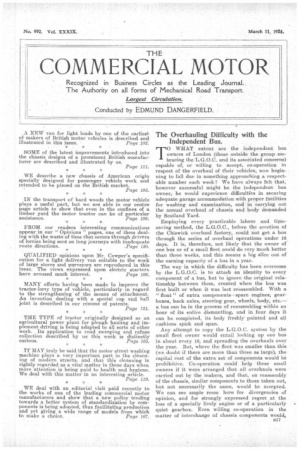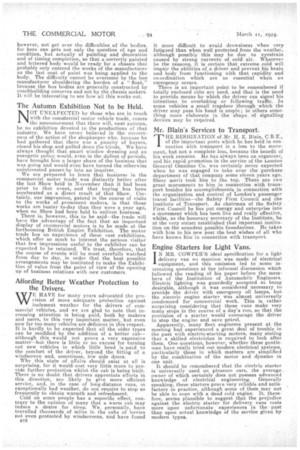The Overhauling Difficulty with the Independent Bus. The Overhauling Difficulty with the Independent Bus.
Page 1

Page 2

If you've noticed an error in this article please click here to report it so we can fix it.
TO WHAT extent are the independent bus owners of London (those outside the group embracing tbe.L.G.O.C. and its associated concerns) capable of, or willing to accept, co-operation in respect of the overhaul of their vehicles, now begin. fling to fall due in something approaching a respectable number each week ? We have always felt that, however successful might be the independent bus owner, he would experience difficulties in securing adequate garage accommodation with proper facilities for washing and examination, and in carrying out the annual overhaul of chassis and body demanded by Scotland Yard.
Employing every practicable labour and timesaving method, the L.G.O.C., before the erection of the Chiswick overhaul factory, could not get a bus through the series of overhaul operations under 16, days. It is, therefore, not likely that the owner of one bus or of a small fleet could do very much better than three weeks, and this means a big slice out of the earning capacity of a bus in a year.
The way in which the difficulty has been overcome by the L.G.O.C. is to attach an identity to ever' component of a bus, but to ignore the original relationship between them, created when the bus was furst built or when it was last reassembled. With a " float " of extra components—spare engines, gearboxes, back axles, steering gear, wheels, body, etc.—• a bus can be in the process of reassembling within an hour of its entire dismantling, and in four days it can be completed, its body freshly painted and all cushions spick and span.
Any attempt to copy the L.G.O.C. system by the small fleet owner would entail locking up one bus in about every 16, and spreading the overhauls over the year. But, where the fleet was smaller than this (we doubt if there are more than three as large), the capital cost of the extra set of components would be prohibitive. Co-operation could help these small owners if it were arranged that all overhauls were carried out by -the makers, and that, on reassembly of the chassis, similar components to those taken out., but not necessarily the same, would be accepted. We can see ample room here for divergencies of opinion, and for strongly expressed regret at the loss of a specially lively engine or of a particularly quiet gearbox. Even willing co-operation in the matter of interchange of chassis components would, however, not get over the difficulties of the bodies, for here one gets not only the question of, age and condition, but actually of painting and decoration and of timing completion, so that a correctly painted and lettered body would be ready for a chassis that probably only entered the works of the manufacturer as the last coat of paint was being .applied to the body. The difficulty cannot be overcome by the bus manufacturer shouldering the burden of a " float," because .the bus bodies are generally constructed by eoachbuilding concerns and not by the chassis makers. It will be interesting to see how all this works out.
The Autumn Exhibition Not to be Held.
NOT UNEXPECTED by those who are in touch with the comniercial motor vehicle trade, comes the announcement that there will, next autumn, be no exhibition devoted to the productions of that industry. We have never believed in the correctness of the action of the shopkeeper who. because he had gathered that there was a paucity of buyers, closed his slio_p and pulled down the blinds. We have always thought that smart window dressing and an energetic policy_ would, even in the dullest of Periods, have brought him a larger share of the business that was going and would even have turned the otherwise uninterested passer-by into an inquirer.
We are prepared to learn that business in the commercial motor trade was distinctly better after the last Show held in November than it had been prior to that event, and that buying has been accelerated as a direct result of that Show. Certainly, our impression, gained in the course of visits to the works of prominent makers, is that those works are busier to-day than they were a year ago, when no Show had been held th enliven business. There is, however, this to be said—the trade will have the advantage of the fact that an important display of commercial motors is to be made at the forthcoming British Empire Exhibition. The motor trade has no experience of these vast exhibitions, which offer so much to interest the serious. visitor that few impressions useful to the exhibitor can be expected to be retained. We trust, therefore, that the course of events will he most carefully watched from day to day, in order that the best possible arrangements may be instituted to make the Exhibition of value from the point of view of the opening up of business relations with new customers.
Affording Better Weather Protection to the Drivers. Affording Better Weather Protection to the Drivers.
WE HAVE for many years advocated the provision of more adequate protection against inclement weather for the drivers of commercial vehicles,. and we are glad to note that in
creasing attention is being paid, both by makers and users, to this very important matter, but even now far too many vehicles are deficient in this respect. It is hardly to be expected that all the older types can be modified by the addition of a better cab— although this would not prove a very expensive matter—but there is little or no excuse for turning out new vehicles in which little heed is paid to the comfort of the driver, beyond the fitting of a windscreen and, sometimes, low side doors. Why this state of affairs should exist at all is surprising, for it would cost very little more to provide further protection whilst the cab is being built. There is no doubt that drivers appreciate efforts in this direction, are likely to give more efficient service, and, in the case of long-distance runs, in exceptionally bad weather, do not require to stop so frequently to obtain warmth and refreshment.
Cold on some people has a soporific effect, contrary to the opinion of many that a warm cab may induce a desire for sleep. We. personally, have travelled thousands of miles in the cabs of lorriea not even protected by windscreens, and have found n_18 it more difficult to avoid drowsiness when very fatigued than when well protected from the weather, although possibly this may be due to eyestrain caused by strong currents of cold' air. Whatever be the reasons, it is certain that extreme ,cold will impair the abilities of a driver and prevent his brain and body from functioning with that rapidity and co-ordination which are so essential when an emergency occurs. There is an important point to be remembered if totally enclosed cabs are used, and that. is the need to provide means by which the driver can signal his intentions to overtaking or following traffic. In some vehicles a small trapdoor through which the driver may pass his hand is ample ; in others aomething more elaborate in the shape of signalling devices may be required.
Mr. Blain's Services to Transport.
THE RESIGNATION of Mr. H. E. Blain, C.I3.E., of the important posts which he has held in connection with transport is a loss to the mayeirsent, but not a complete loss, because the benefit of his work remains. he has always been an organizer, and his rapid promotion in the service of the London General Omnibus Co. was certainly never expected when he was engaged to take over the purchase department of that company some eleven years ago. Sheer merit took him to the top. There are two great monuments to him in connection with transport besides his accomplishments in connection with the organization and control of London's passenger travel facilities—the Safety First Council and the Institute of Transport. As chairman of the Safety _ First Council he has put energy and enterprise into a movement which has been live and really effective, .whilst, as the honorary secretary of the Institute, he at the very outset established that important institution on the soundest possible foundations. He takes with him to his new post the best wishes of all who have known him" in connection with transport.
Engine Starters for Light Vans. .
IN MR. COWPER'S ideal specification for a light delivery van no mention was made of electrical equipment, and this omission led to some interesting questions at the informal discussion which followed the reading of his paper before the members of the Institution of Automobile Engineers. Electric lighting was guardedly accepted as being desirable, although it was considered necessary to provide the driver with emergency oil lamps, but the electric engine starter was almost universally condemned for commercial work. This is rather surprising considering that these vans make very many stops in the course of a day's run, so that the provision of a starter would encourage the driver to stop the engine and save petrol.
Apparently, many fleet engineers present at the meeting had experienced a great deal of trouble in the past with electric-starting motors, many stating that a skilled electrician is required to look after them. One questions, however, whether these gentlemen have really tried out modern electrical systems, particularly those in which matters are simplified by the combination of the motor and dynamo in one unit.
It should be remembered that the electric starter is universally used on pleasure ears, the average. owner of which certainly does not possess advanced knowledge of electrical engineering. Generally speaking, these starters prove very reliable and satisfactory in practice, although some of them may not be able to cope with a dead cold engine. It, therefore, seems plausible to suggest that the prejudice against the electric starter for delivery vans rests more upon unfortunate experiences in the past than upon actual knowledge of the service given by modern types.
































